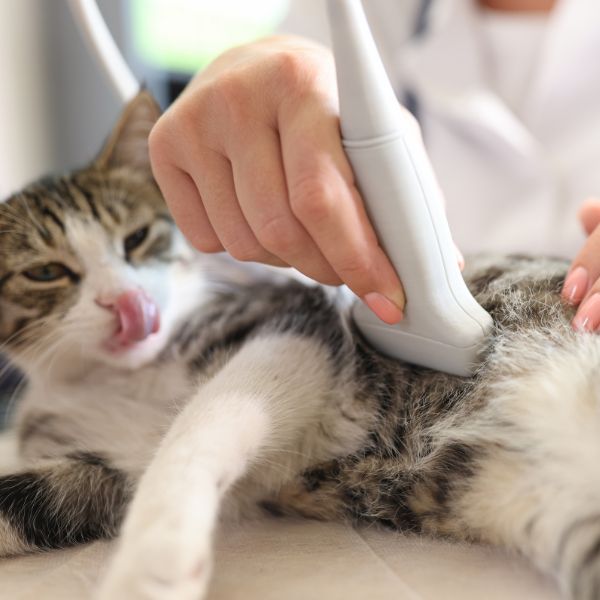Pet Diagnostics
Veterinary diagnostics involve comprehensive medical testing, such as blood work, imaging, and laboratory analysis, to accurately diagnose and treat illnesses in animals.

What Are Pet Diagnostics?
Veterinary diagnostics refer to the tests and procedures used by our veterinarians to identify diseases, conditions, and overall health status in pets. These diagnostics include blood tests, imaging (X-rays, ultrasound, MRI), urinalysis, fecal exams, biopsies, and molecular testing to detect infections, genetic disorders, and other health issues. They play a crucial role in preventive care, early disease detection, and treatment planning for animals.
Bloodwork
Bloodwork is a series if laboratory tests that analyze an animal’s blood to assess overall health, detect diseases, and monitor organ function.
Common veterinary blood tests include:
- Complete Blood Count (CBC): Measures red and white blood cells, platelets, and hemoglobin to detect infections, anemia, and immune system disorders.
- Blood Chemistry Panel: Evaluates organ function (liver, kidneys, pancreas), electrolyte balance, and metabolic health.
- Thyroid Tests: Check hormone levels to diagnose thyroid conditions.
- Blood Clotting Tests: Assess blood’s ability to clot properly, important for surgery or bleeding disorders.
Bloodwork is often used in routine checkups, pre-surgical evaluations, and diagnosing illnesses in pets.
Urinalysis
Urinalysis is a diagnostic test that examines an animal’s urine to assess kidney function, detect infections, and identify metabolic disorders such as diabetes. This test evaluates urine for its physical properties (color, clarity, and concentration), chemical composition (pH, protein, glucose, ketones, and blood), and microscopic elements (bacteria, crystals, and cells). Urinalysis is commonly used alongside bloodwork to provide a more comprehensive picture of your pet’s health, aiding in the early detection of conditions like urinary tract infections, kidney disease, and dehydration. It is a vital tool in routine checkups, disease diagnosis, and monitoring ongoing treatments.
Ultrasound
Ultrasounds are non-invasive imaging tests used to examine a pet’s internal organs in real-time, providing valuable insights into their health. This diagnostic tool uses sound waves to create detailed images of structures such as the liver, kidneys, bladder, heart, and reproductive organs. Ultrasounds are commonly used to detect tumors, fluid buildup, pregnancy, and organ abnormalities. Unlike X-rays, which capture static images, ultrasounds allow veterinarians to observe movement, such as blood flow and heart function. This painless procedure is often performed alongside other diagnostic tests, like bloodwork and urinalysis, to ensure a thorough evaluation of a pet’s condition.
We proudly serve the pets of San Antonio, TX.
It is our mission to create a partnership with our clients to nurture the human-animal bond by providing compassionate veterinary care throughout every stage of your four-legged family member's life.

